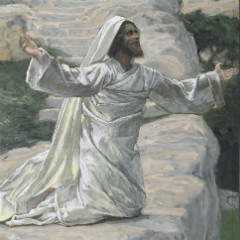
James, the brother of Jesus, was serious about his prayer. He used to go to the temple and kneel in prayer so often and for so long that his knees were reputed to be as calloused and tough as a camel’s. He was bishop of Jerusalem then and was martyred several years before the temple was ultimately destroyed, but as long as he had life he could be found, as one ancient writer put it, “bending the knee in adoration to God, and begging forgiveness for the people.”
Given his intense practice, it comes as no surprise that James discusses prayer in the letter that bears his name. These verses in the fourth chapter hit me this morning: “You do not have, because you do not ask. You ask and do not receive, because you ask wrongly, to spend it on your passions.”
I’ve heard people quote that first sentence a million times to say that all you have to do is ask, and if you ask in faith then God will answer. (I notice that people usually quote it from the King James: “ye have not because ye ask not.”) The idea seems to be that God is just waiting around to bless us if we’ll only make a peep.
But what about the second sentence? “You ask and do not receive, because you ask wrongly, to spend it on your passions.” Passions basically equates to sinful desires. So to that point, what if we live our lives out of sync with our prayers? What if we pray for things to gratify or satisfy our lusts or our anger or our fears or (insert your particular issue)? James seems to say that God won’t give us what we ask.
Other writers have followed James’ train of thought, and I find their observations as helpful as they are convicting.
“Our life should correspond to our progress in the faith, and we ought to offer our prayers to God in accordance with the way we live our life,” writes Mark the Monk, a fifth century ascetic who lived in Egypt. Mark’s comments are particularly interesting because he was a perceptive observer of the human heart. He saw through the subtleties of the passions and how we can be double-minded and undone by things of which we’re barely conscious.
Says Mark, “A passion that someone willingly allows to dominate his activity will later violently stir up the person who is under its influence, even against his will.” The comment reminds me of Paul’s statement of personal frustration with sin in Romans.
“The person who hates the passions removes their causes,” says Mark, “while the person who is addicted to those things which cause the passions is attacked by the passions, even though he may not wish it.” But the trouble he says is that secretly “We love the causes of involuntary thoughts, and that is why they come.”
How many secret thoughts and subtle passions are hindering our prayers? In his essay on prayer, Montaigne says that when we pray while harboring sinful thoughts, “we ourselves present to [God] the rods with which to chastise us.” He paints a worrisome picture of people whose conduct is so double-minded that their prayers are really “only an act.” Taken to that extreme, prayers like this are more superstition than true petition. And sin is what takes it to that extreme.
Reading these passages I am increasingly mindful about seeking anything of God before seeking repentance. I am also gratefully reminded that there are people like James constantly praying for my repentance and forgiveness. I can use all the help available.











